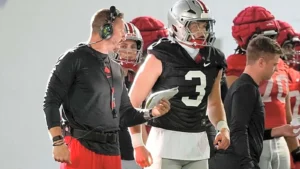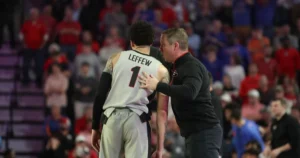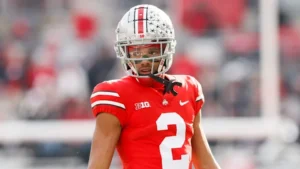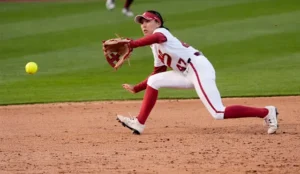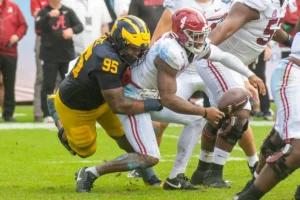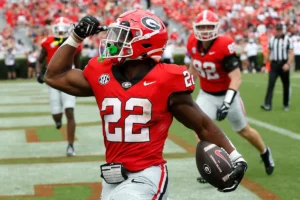Kentucky basketball’s Otega Oweh declares for NBA draft but maintains college eligibility
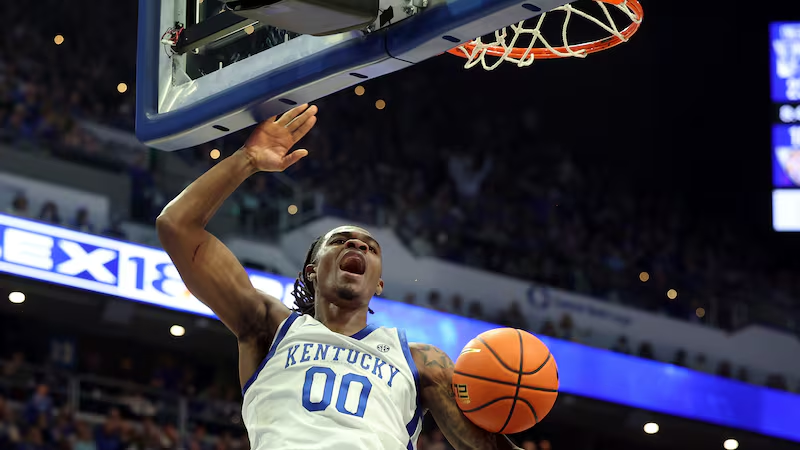
In a move that has the college basketball world buzzing, Otega Oweh, a standout player for the University of Kentucky Wildcats, has officially declared for the NBA Draft but has maintained his college eligibility. This dual decision, while not uncommon in recent years due to changes in the NCAA’s rules, marks a pivotal moment in Oweh’s career and offers a fascinating glimpse into the evolving landscape of college basketball. In this article, we will analyze the significance of Oweh’s decision, his potential in the NBA, and how this move aligns with the shifting dynamics of college basketball recruitment and draft eligibility.
The Decision to Declare for the NBA Draft
Otega Oweh’s decision to declare for the NBA Draft has raised many eyebrows and garnered significant attention. It is not the first time a player has opted to declare for the draft while maintaining college eligibility, but it has become increasingly common among top-tier college athletes who are unsure about their future in professional basketball. Under NCAA guidelines, players are allowed to declare for the draft while retaining their eligibility as long as they do not hire an agent. This offers them the unique opportunity to explore their options and gather feedback from NBA scouts, coaches, and executives without fully committing to a professional career.
For Oweh, the decision comes after an impressive season with Kentucky, during which he showed flashes of brilliance that drew the attention of scouts and analysts. His performance in both conference games and non-conference matchups made it clear that he has the potential to make an impact at the next level. However, the NBA draft process is a complicated one, and for many athletes like Oweh, declaring provides an opportunity to better understand where they stand in the eyes of NBA executives.
By declaring, Oweh is able to attend the NBA Draft Combine, where he can compete in workouts and interviews, meet with coaches, and receive formal evaluations. This is a crucial step in helping him make an informed decision about his future. It is important to note that declaring for the draft does not automatically mean a player will be selected; it is a way for the athlete to assess their potential without severing ties to their college program.
Why Maintain College Eligibility?
Otega Oweh’s decision to maintain his college eligibility by not hiring an agent is perhaps the most interesting aspect of this move. The NCAA rule changes in recent years, which allow players to test the waters without sacrificing their eligibility, have led to a situation where players can get the best of both worlds. This rule gives athletes the chance to engage with the professional side of basketball while not burning bridges with their college program. If Oweh were to hire an agent, he would lose his eligibility and would be forced to forgo his college career.
The decision to keep his eligibility open gives Oweh significant flexibility in a highly uncertain environment. If Oweh receives feedback that he is not likely to be selected in the NBA Draft or that he needs to develop further before making the leap to the pros, he can return to Kentucky for another season, continue his development, and re-enter the draft the following year. This gives Oweh more control over his career and, importantly, the opportunity to continue playing for a program like Kentucky, which is known for its ability to develop NBA talent.
Moreover, maintaining his eligibility ensures that Oweh has options. If he is selected in the draft, he can pursue a professional career with the security of knowing that he has the backing of his college program. On the other hand, if he decides that another year in college would benefit his development, he can return to Kentucky and continue to play under the guidance of Coach John Calipari, who has helped many players transition from college basketball to the NBA with great success.
Otega Oweh’s Impact on Kentucky Basketball
Otega Oweh has been a standout player for Kentucky this season, demonstrating his skills as a versatile forward with the ability to impact the game on both ends of the floor. Oweh’s athleticism and size have made him a matchup nightmare for opposing teams. His ability to drive to the basket, shoot from the perimeter, and play solid defense has drawn the attention of NBA scouts who see him as a potential two-way player at the next level.
Oweh’s strength lies in his athleticism and his versatility, traits that have become highly valued in the NBA in recent years. Standing at 6-foot-8 with a long wingspan, Oweh has the ability to defend multiple positions, a key asset in today’s NBA, where positionless basketball has become increasingly popular. Offensively, he has the capability to stretch the floor with a respectable three-point shot while also being able to drive to the basket and finish above the rim. His basketball IQ and competitive drive have been important factors in his development under Calipari, who is renowned for helping players refine their skills for the NBA.
However, as with many young players, Oweh still has areas of his game that need refinement before making the leap to the professional level. While his athleticism is off the charts, he can sometimes struggle with consistency, particularly when it comes to decision-making under pressure. His shooting form and shot selection will need to improve for him to become a consistent offensive threat in the NBA. Additionally, while his defense is solid, improving his lateral quickness and ability to guard quicker, more skilled players will be crucial for him to become a standout on that side of the ball.
These areas of development are likely a key reason why Oweh has opted to test the waters of the NBA Draft. By declaring, he is giving himself the opportunity to work with NBA scouts and coaches to address these concerns. This feedback will be invaluable in deciding whether he should return to Kentucky for another year or take the plunge into the professional ranks.
The Role of Coach John Calipari in Oweh’s Decision
Kentucky head coach John Calipari has long been known for his ability to get his players ready for the NBA, and Oweh’s decision to declare for the NBA Draft but keep his eligibility intact can be seen as part of a larger strategy in line with Calipari’s philosophy. Calipari’s track record of developing players such as Anthony Davis, DeMarcus Cousins, and Bam Adebayo, all of whom became successful NBA players, speaks for itself. His ability to provide a platform for players to showcase their talents while developing their skills in the college environment has been a major selling point for top recruits.
In Oweh’s case, Coach Calipari’s system has undoubtedly played a key role in his development as a player. Under Calipari’s tutelage, Oweh has been able to refine his skills and increase his visibility among NBA scouts. Furthermore, Calipari’s relationship with NBA teams and executives gives players like Oweh a unique advantage. Calipari’s endorsement can help Oweh understand the nuances of the NBA game and guide him through the draft process, which can be a stressful and overwhelming experience for young players.
Should Oweh choose to return to Kentucky for another season, he will likely benefit from continued guidance and mentorship from Calipari, who will ensure that Oweh’s development stays on track. This could ultimately make Oweh a more attractive prospect in the next NBA Draft, as he will have the opportunity to work on his weaknesses while continuing to develop his strengths in a structured college environment.
The Shifting Landscape of College Basketball and the NBA Draft
Otega Oweh’s decision to declare for the NBA Draft while maintaining his college eligibility is just one example of the changing dynamics of both college basketball and the NBA Draft process. The NCAA’s rule changes in recent years have created a more player-friendly environment, giving athletes more control over their future while still allowing them to receive a college education.
The introduction of the NBA G League Ignite program, which offers top high school prospects the opportunity to develop professionally without going to college, has also contributed to the changing landscape. This alternative pathway to the NBA, along with the rule changes in the NCAA, has led to a greater variety of options for young players. Athletes like Oweh can now choose to pursue a professional career while still benefiting from the college experience, creating a more flexible path to the NBA.
Moreover, the increasing trend of declaring for the NBA Draft while maintaining college eligibility highlights the growing importance of player development. College programs, particularly those like Kentucky, have become incubators for NBA talent, where young players can refine their skills in a competitive environment before making the leap to the pros.
Otega Oweh’s decision to declare for the NBA Draft while keeping his college eligibility intact is a smart move that reflects both his potential as a player and the changing nature of college basketball. By declaring, Oweh can gather valuable feedback from NBA scouts, test his readiness for the next level, and make an informed decision about his future. At the same time, he retains the option of returning to Kentucky for another season, where he can continue to develop his game and improve his draft stock.
In the larger context, Oweh’s decision highlights the growing complexity of the path from college basketball to the NBA. As the NCAA continues to evolve and as more players explore alternative routes to professional basketball, the future of college basketball and the NBA Draft process will likely continue to shift. Oweh’s situation serves as a microcosm of these changes, showcasing how young athletes are becoming more strategic and savvy in navigating the landscape of modern basketball. Whether he decides to enter the NBA Draft or return to Kentucky for another year, Otega Oweh’s journey will undoubtedly be one to watch.
